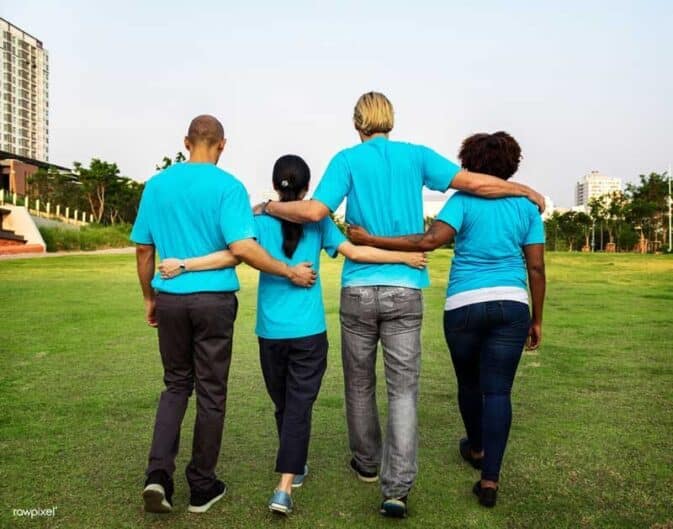Making a difference could be an entire philosophical debate on its own. The concept of making a difference is versatile and diverse. Many experienced philosophers would break their teeth trying to define what a difference is and how to make one in everyday life. For the purpose of the exercise, we need to narrow it down to a clear definition, namely improving someone’s life in any manner that is possible, including financial support but not only. Ultimately, there’s a sense of addressing current difficulties and reducing them, temporarily or permanently, for the benefit of others. But more importantly, the real question is why do people want to make a difference?
What is pushing us to seek to change a situation?
The answer, as it happens, is a complex mixture of selfishness and selflessness. Of course, we want to help others because the idea of someone going through unnecessary and unfair pain is unbearable. But when it comes to understanding why we can’t bear to see others suffer, blunt honesty brings us back to reality. We help because it could be us and because we would want someone to help us. In other words, you’re making a difference not only for others, but for yourself. The bigger the difference, the more you hope that you can leave an indelible trace in the fabric of the world so that, when you’re long gone, someone can still remember you. We help because we want to matter, for one person, ten, ten million. If you matter, you’re not forgotten. Do we make a difference because we’re terrified of death? It’s the most logical explanation.
But, at the same time, it makes it incredibly challenging to continue to be a positive force to improve life when everyone else is trying to do the same. How can you make sure your good work doesn’t get lost in the crowd?

Your role models are out of your league
For anyone who wants to have a positive impact on the world, it’s easy to fall in the old trap of comparing pears and apples. Indeed, for many, you can’t make a significant improvement without having sufficient funds. As a result, the typical understanding of philanthropy – the love of humanity – implies generous donations for the benefit of others. The news is full of examples of life-changing philanthropic actions, and it’s fair to say that comparing your activities to someone like Bill Gates, who is renowned for his charity work, can only be disheartening. The Bill and Melinda Gates Foundations has donated over 30 billion dollars support global health, global development, global opportunities, and global policies. It’s a secret to nobody that Bill Gates plans to eradicate malaria from the planet, saving millions of lives in the process. Gates is a positive role model when it comes to making the world a better place, as he focuses his efforts on structured, organized and strategic campaigns that make a global difference.
Back to reality, now: Unless, you too, are a famous billionaire with a genius business know-how, there’s no point thinking of Gates as a role model. As inspiring as the man is, you can’t match his philanthropic efforts. Instead of contemplating what others can do, you need to focus on how your set of skills and your assets can transform someone’s life for the better.
You don’t need to be big to help
If there is one lesson to be learned from Bill Gates’s philanthropic projects is that he doesn’t work alone. The foundation, for a start, is a joint project with his wife, Melinda. Additionally, he chooses partners who can bring something new to health, growth, development and policies projects. Similarly, doing good is not a matter of how much you can give, but how organized your efforts are. Joining a charitable organization can provide you with the opportunity of participating in a structured strategy. You can, for instance, find out if your local life savers thrift stores need helpers or if you can donate items that would be useful. Think of it as a carefully administered effort. Just like no single ant could carry an entire slice of ham, an ant colony works together as one to make it happen.
Understand that it starts with you
Helping someone is the purest form of relationship. It’s a way of expressing your love for people, regardless of who they are or where they come from. The sole fact that you are willing to help means that you can understand their struggle. But, ultimately, not everyone is in a mental and emotional position to make a difference. You can’t help anyone if you don’t take care of yourself first. Otherwise, you don’t have the power to make any difference. Looking after yourself is about understanding what gives you the strength to be there for someone else. You can’t afford to ignore your personal obstacles and pretend that you’re strong enough to tackle someone else’s issues. The truth is that is you want to give 100%, you need to be at 100%. In other words, your health, your mood, your sense of integrity and self-respect are a prerequisite condition to any philanthropic influence. As the saying goes, you can’t love someone, if you don’t love yourself first. The love of humanity begins with you.
You can’t be everybody’s savior
There’s nothing more difficult than having to walk away from a crisis. When you’ve decided to help others, you will inevitably face an impossible dilemma; aka meeting someone who doesn’t want to be helped or who you, unfortunately, can’t save. Consider this a vital lesson in your philanthropic journey. You can’t save everyone, and that’s okay. For many, accepting to let go can feel like a failure. But you would be wrong to let it distract you from the bigger picture. You can make a difference if you try. But, in the end, it doesn’t matter how deep your empathy runs. You can’t take responsibility for carrying someone else’s problems and pain. Their struggle is theirs. When there is nothing you can do to help, it’s important to remember not to walk away under the burden of their issues. Instead, recognize and accept that there are situations that are simply beyond your abilities. Don’t blame yourself. You haven’t failed. You only fail if you choose to give up and stop helping anyone.
Accept that not everybody wants help
Not everyone can be helped. Similarly, not everyone is asking for your help. Too many people fall in the trap of constantly offering a solution, even though nobody asks for it. You can’t think like a problem-solver each time you talk to someone. Even if you have the intentions at heart, you shouldn’t try to fix issues without understanding what your interlocutor expects from you. Sometimes, all one person needs is for you to listen to what they have to say. They are going through a hard time, but they just want to talk about it and vent. Offering a solution is not only counterproductive, but it’s also going to frustrate them. You have to learn to stop yourself from trying to make problems go away. Most people just need a friend to talk to. But interrupting with a quick fix is only letting them know that you don’t want to listen. And ultimately, where is your love for humanity if you can’t bear the idea of hearing what people have to say?

Be the difference; accept those who are not like you
Everyone has different stories; background, beliefs, and dreams. As such, your first priority is you are to improve the lives of others is to accept that these differences. Diversity is, ultimately, part of what makes humanity unique. It should never interfere with your philanthropy, your love for humanity. Your journey to make a difference begins with creating a path of tolerance and openness. Yes, not everybody shares the same religion, language, values, or even identity. But, making a difference is about seeing past those differences to connect with the people. More importantly, understanding what an obstacle means in a unique situation gives you the ability to provide the help that is needed. Not everyone needs the same solution even though they might share the same issues.
Can you encourage others to help too?
Last, but not least, while we’ve touched on the many ways in which you can make a difference, it would be foolish to pretend that money doesn’t play a significant role. Ultimately, Bill Gates has been able to achieve great results with the Bill and Melinda Gates Foundation because he could use his wealth as leverage to launch projects. When you don’t have to same money in the bank, you need to convince others to donate too. Online campaigns can not only prove useful, but they enable anybody to give toward a bigger objective, such as providing funds to rebuild properties destroyed by a tornado or offering to finance medical treatment for a sick child. Encouraging people to help might require a different set of skills – from marketing communication to administrative management – but it can help to make the world a kinder place.
Making a difference is a journey of self-improvement during which you learn to help, listen to, and love others. Whether you’re willing to give money or you want to give time to a charitable organization, making a positive difference has never been that easy.











